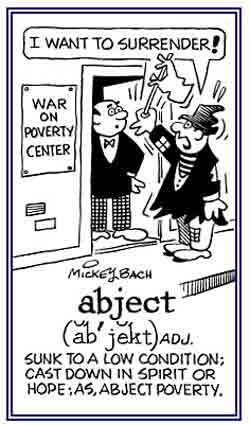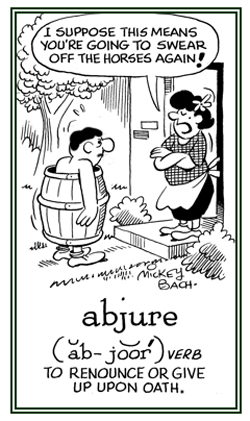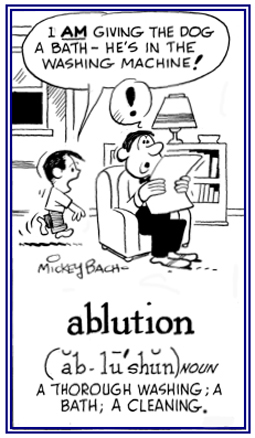a-, ab-, abs-
(Latin: prefix; from, away, away from)
This prefix is normally used with elements of Latin and French origins (abs- usually joins elements beginning with c, q, or t).
The form ab- is regularly used before all vowels and h; and it becomes a- before the consonants m, p, and v. The prefix apo- has similar meanings.
This list is a very small sample of the multitudes of a-, ab-, abs- prefixes that are available in dictionaries and those in this unit are only meant to present a few examples.
Jeffrey sighed and abjectly walked away after being exposed as a swindler.
2. Regarding how a situation is handled in a hopeless resigned manner: Joshua abjectly shrugged his shoulders when his wife started another session of complaining.
Go to this Word A Day Revisited Index
for a list of other images which you can enjoy.
2. The submissiveness or fawning in attitude or behavior: Terri's abjectness revealed that she was so servile and overly willing to serve or to obey other people that no one respected her.
As their father, Tyrone felt it was necessary to abjure the habits of his children's excessive eating and sitting around playing computer games all the time and insisted on them exercising instead.
Pacifism abjures the use of deadly force.
2. To withdraw from or to recant publicly; to disclaim or to repudiate: Douglas abjured his life of bad eating and drinking habits when he determined to stop eating so much fried foods.Some of the prisoners abjured their past criminal acts during the religious service held in the prison on Sunday.
3. To formally reject rights, allegiances, etc. on oath; to renounce; to give up opinions publicly; to recant: The school principal wanted to be sure that Mildred abjured her false story about being tardy because her bus was late before she would be allowed to return to school.4. To beg or to earnestly entreat: Right after the final decision as to the prisoner's guilt, he started to abjure the judge for mercy.
Henry was abjuring his supervisor to give him another chance to complete the job which he failed to do on time.
5. Etymology: from Latin abjurare, "to swear to, to confirm, or to deny by an oath"; from ab-, "away" + jurare, "to swear"; from jus, juris, "law".

Go to this Word A Day Revisited Index
so you can see more of Mickey Bach's cartoons.
2. Anyone who implies a firm and final rejection or abandonment of a former belief or position, often made under oath: The two abjurers, Steven and Edward, met with the media to explain their joint decision to discontinue their previously held political commitments.
The nurse provided an educational booklet to the new mothers about the ablactation of infants.
There is considerable research in the area of ablactation which makes available appropriate information for the nourishment of human infants and for the young of mammals.
It would appear that the icebergs are ablating faster than scientists had anticipated.
After a heavy rain, the top soil ablates from the field and runs off into the stream.
2. In medicine, to amputate or otherwise to destroy a biological function, for example by removing a bodily tissue with a laser, or by means of burning with electric heat: The doctor ablated the abnormal number of warts that had formed on Colleen's body with electrocautery.The doctor indicated that she would ablate the lump from Tanya's leg.
After Patrick's crushed foot was ablated in an accident, he learned to walk and to run with a prosthetic foot and shoe.
2. The erosive processes by which a glacier is reduced by wearing or wasting away: Melting and the breaking off of a mass of ice from its parent glacier or ice shelf are ablations that icebergs undergo during the summer months.
3. In aerospace, the dissipation of heat generated by aerial friction: There are ablations in atmospheric reentries of spacecrafts or missiles with the use of melting heat shields.
2. Tending to be removed or vaporized at very high temperatures: The ablative material on the rocket cone fell off.
3. In grammar, applied to one of the cases of the noun in Latin and some other Indo-European languages: The ablative case is the removal, separation, or taking away and indicates the direction away from, or time when.
Grammatical "cases" are changes in form that are made of nouns or pronouns to reflect how they are used in sentences. For example, the noun "men" is changed to "men's" and the noun "woman" is changed to "women's" to show possession. Nouns in English once had several case forms, but the only one used today is the possessive case.
Pronouns continue to change case forms to show their relations to the rest of the elements in a sentence. The three cases of pronouns are "nominative", "objective", and "possessive" cases.
Raymond's sister had to memorize lists of ablative cases when she was studying a foreign language at school.
All of the ablative cases which the author used made the story interesting but a bit convoluted.
Examples of Grammatical Cases
Nouns and pronouns can be subjects, objects, or possessives and many pronouns and a few nouns show these various uses:
- Nominative Cases: I, we, him, she, it, who
- Objective Cases: me, us, him, them, her, whom
- Possessives: our, my, mine, their, theirs, his, its
The nominative case shows that the noun or pronoun is being used as the subject of the verb: "The students learned about subjects in the English class and they usually know that verbs show what the subjects are doing."
The objective case indicates that the noun or pronoun is functioning as:
- Object of the verb: "Jessica's complimentary remarks about Mike's work made him feel good."
- Object of a preposition: "Everyone went home after the meeting except Phil.
2. The outer surface of a spacecraft or missile: "Ablation" is the erosion of the protective outer surface, or ablator, of a spacecraft or missile resulting from aerodynamic heating caused by travel at hypersonic speeds during reentry through the atmosphere.
The ablators on the spacecraft were welded into place using a specialized metal that would withstand great heat.
The students were asked to find the single example of an ablaut in the poem that they memorized.
The grammar teacher wrote several examples of ablauts on the chalkboard for the students to study.
There are usually several different abluents available in supermarkets that are used to clean all kinds of things in one's home.
The abluent effects of vinegar are said to be of great value.
In some religions, an ablution may be a prescribed washing of part or all of the body or of possessions, such as clothing or ceremonial objects with the intent of purification or dedication.
2. The liquid used in showering which may refer to the practice of removing sins, diseases, or earthly defilements through the use of ritual deputation or to become purified or cleansed: Before saying his prayers, Gregory used an ablution that represented the spiritual cleansing of his sins.Like most ritual acts, ablutions may carry a wide range of meanings for those who perform it, for example the act of cleansing may be only a gesture that is symbolic of a desired purity of the soul.
3. A scrubbing of a person's body or body parts; a bathing, a cleaning: Because of the heat, Charlene felt the need for a refreshing ablution.After consecutive ablutions at the sink, Pearl was finally able to wash the smell of garlic off her hands.
Gertrude's husband performed an ablution of his feet every night before going to bed.
4. Etymology: from Latin abluere, "to wash off"; ab-, "away" + luere, "to wash".
Go to this Word A Day Revisited Index
so you can see more of Mickey Bach's cartoons.
2. A reference to a religious purification of the body by washing, especially a ritual washing of the hands, etc.: Robert completed his ablutionary ceremonies of soaping up, rinsing, and the drying of his hands each morning before going to prayer in the chapel.


